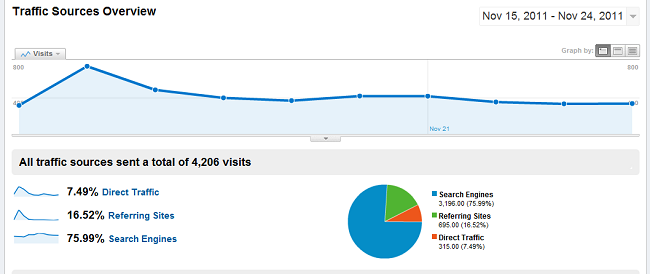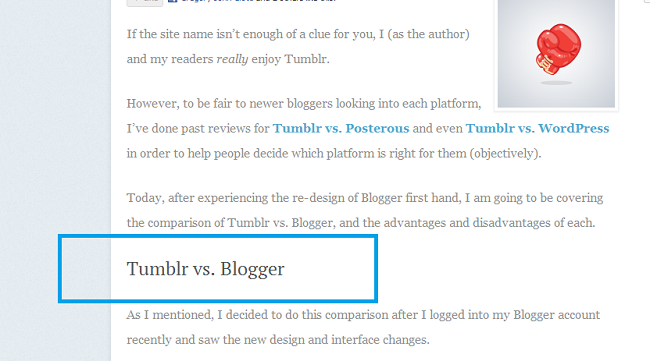How A Brand New Blog Brings In 3000 Unique Visitors A Week From Search Engines

Starting a new blog is definitely a daunting task, especially if you are running one or two other blogs already.
When I saw an untapped subject for a for a brand new blog recently, I wanted to jump aboard, but I knew that my workload over on my electronic music blog and Sparring Mind was a lot already, so this new blog would have to be fairly self-sufficient.
What do I mean by that?
Basically, I didn’t want to have to do a ton of promotion for this new blog to start picking up traffic.
I wanted to build it in the background while I focused on my other two sites, and when I had the time, I could pour more focus into it.
How could I possibly do this?
By treating the “blog” more as a “niche site“, or more accurately, an authority site.
That means that the lifeblood of this new blog would have to be a traffic source that could grow consistently without a ton of work involved in doing guest posts and networking.
The solution?
A blog that ran almost entirely on SEO, just like a niche site would.
And now, a couple of posts later, I’m getting 3000 unique visitors a week from almost exclusively search engines.
But how?
Read on, because not only am I going to reveal the niche, I’m going to show you exactly what I did.

1.) Find A Niche With Multiple Keywords
The difference between an authority site (and a blog that depends on SEO) and a niche site is that niche sites generally target only one relatively untapped keyword.
This type of SEO dependent blog and authority sites, however, don’t focus on one keyword: they focus on one niche topic that has a few good keywords to rank for (ie, ranking for long tail keywords and multiple terms around a single topic).
That’s why I did for my site.
I guess it’s also time for me to reveal what it’s about!
Note: I’m revealing my niche so that you can learn exactly what I did, I’m doing it in confidence that you won’t outright steal my topic, although I do welcome healthy competition :).
Basically, I had recently started using the Tumblr platform, and I noticed that there weren’t any good resources for bloggers using that platform, so I created I Love Tumblr, the niche blog that focuses on Tumblr tutorials and “how-to’s” for Tumblr bloggers.
I picked writing about the Tumblr platform for the following reasons:
- Topics about “brands” get searched more, and Tumblr doesn’t really mind people using ‘Tumblr’ in their domain name (meanwhile, WordPress does). This helps me rank better for terms related to Tumblr.
- Tumblr searches had a few strong keywords that nobody was pursuing, this is mostly due to the userbase using the platform casually, and with most social media sites not knowing how to cover Tumblr (since it’s a blog + social networking platform).
- I knew the topic well, since I actively use Tumblr myself, and since I am experienced with blogging, it was easy for me to take blog advice and apply it to Tumblr.
Speaking of which, Google Plus, Jux, Flavors.me, Posterous, and many other social sites don’t have a “big” blog covering how to use them. If you are a regular user, now might be the time to pursue a tutorial site on these and other platforms…
Anyway, back on topic!
So I knew I could write articles that could rank, I knew the niche well, and I knew Tumblr related searches were of a good volume (and rising).
So how did I get this bad boy started?
2.) Google Keyword Tool: Still Useful!
Finding topics to write about was really easy for this new niche, and honestly, all I used to start off was the superb Google Keyword Tool (I love and use Market Samurai myself too, but for this niche, the Google Keyword Tool was all I needed).
The process went like this (typical keyword research process):
- Search for “Tumblr”
- Organize for highest search terms monthly
- Change from “broad” to [exact] search queries
- Skip over the ones that don’t make any sense
To clarify: when I say terms that “don’t make sense”, I mean don’t make sense to write about, such as search terms for popular Tumblr users (for instance, it would be hard to rank for “Katy Perry Tumblr” anyway, since people are just looking for her Tumblr blog)
From there, I picked the most popular search terms that were two words long at first, and wrote some awesome articles about them.
To save you the trouble of filtering through the Google Keyword Tool yourself, let’s look at some of my most popular ones:
- “Tumblr search” —> I wrote an articles about how to rank well in Tumblr search by using the tag system effectively.
- “Tumblr vs WordPress” —> I did an honest comparison of my two favorite blogging platforms, and criticized Tumblr where necessary. People really appreciated my honesty, and I regularly rank #1 for this term (sometimes #2 or #3)
- “Tumblr widgets” —> I compiled a list of 40+ widgets to use on your Tumblr blog, and posted it to Reddit, where it was a top post on the r/Tumblr section.
- “Tumblr mobile” —> I created a guide on how to post to your Tumblr from anywhere using your phone.
The best part?
For most of these terms, I’m not even on the front page, which means that when I do get on the front page, I’m going to be seeing much more traffic than I already do.
3.) Writing Articles to Rank
My on-site SEO strategy was really, really easy.
My formula for writing articles started with making the permalink structure the exact search term.
For instance, on my guide for how to add Tumblr comments (using Disqus), I made the permalink /tumblr-comments/, and removed any “fluff” words (such as “a”, “of”, “to”, etc.) since they contribute nothing to ranking.
After that, I wrote an awesome article!
That’s the tough part ;).
When writing, there were three important things I kept in mind to rank better, and they aren’t complicated at all:
- Placing an H1 (headline) tag early with the appropriate keyword.
- Having the right keyword density for each post.
- Interlinking my new posts to my old posts (sometimes with contextual anchor text, sometimes not).
For the H1 tag, I always made sure that it appeared after the article’s intro.
For example, on my Tumblr vs Blogger article, the keyword “Tumblr vs. Blogger” appears early in the article in an H1 headline, which is good for search engines, as long as you do it naturally.

I did this for almost every article, and it has worked wonders for such a small trick.
Next, I used a few tools to make sure my keyword density was right (such as Scribe SEO) and my own knowledge of SEO copywriting to know when I had too many keywords in the post or too few.
As I mentioned, I also interlinked heavily to my other articles in each new post, making sure they were contextual at times, and not at others (in case you are new, contextual means linking back with anchor text that matched what I was trying to rank for. So on some posts I would link back to my “Tumblr vs. WordPress” article with the words ‘Tumblr vs. WordPress’, and other times I wouldn’t so the interlinking looked natural to Google).
4.) Building Backlinks
Since my niche was so untapped, I honestly did not have to do a lot of backlinking.
I had two main backlinking “strategies” for this new blog, although they won’t always be this easy depending on your niche:
- A few backlinks from people willing to do them for a cost to get the ball rolling.
- Creating natural buzz with Reddit.
- Guest blogging.
The backlinks I got were through social sites only, no “XRumer blasts” or any of that, just a few links so that my domain got picked up by Google easily.
The real strategy came in my use of Reddit.
I am a mod over on r/Tumblr, and since I put a lot of time and effort into each of my articles, submitting them to this subreddit usually got them voted to the top.
Reddit is a tough crowd, and generally downvotes any blog content, unless it is well written and totally un-spammy.
So I used a friendly site design, wrote the best articles I could, and submitted them as if I was providing a resource, not promoting my own stuff.
And the Redditors of r/Tumblr really helped me out!
My Tumblr vs. WordPress article ranks as well as it does right now due to simply that one submission on Reddit, since it picked up a few social media shares which helped it gain popularity.
I also featured I Love Tumblr on a few guest posts that were specifically about blogging on Tumblr, including one on Problogger.
Guest blogging can be one of the greatest way for building quality backlinks, even SEO newbies recognize the need for a few guest post backlinks from high authority blogs.
If you are able, definitely go for the contextual backlink on each of your guest posts (some authors do not allow this).
For instance, the search term “love Tumblr” is actually pretty popular, so I would sometimes link back to my blog like this: “Greg is an avid blogger who also specializes in effective tumblogging over on his site for writers & bloggers who love Tumblr.”
If you are a reader of Glen Allsopp (of ViperChill), you’ll see he used guest blogging in this way to rank #5-6 for the term “personal development”, which is a very competitive search term.
The point: guest blogging is awesome (I use it for every new site), and a great way to build a few high quality contextual backlinks.
Those initial steps allowed me to build a site that almost exclusively operated on search engine traffic, and should only be able to get bigger once I put more effort into it!
The One Thing To Worry About…
There is one bad thing about search traffic for a new blog…
If you depend on it, it could be gone at any time.
Tumblr may die in popularity, I may lose my rankings for some reason (I don’t do any paid backlinks, but you never know with Google), and I’m not currently building an email list.
Over To You
What do you think about my strategy of running a blog on pure search results?
What ways could I really step things up a notch, and what should I look out for?
Lastly: If you’re more of a WordPress person, feel free to visit me at Sparring Mind, my WordPress marketing blog that is big on data and not on fluff.
 5 Blogging Limiting Beliefs about Money that You Need to Release
5 Blogging Limiting Beliefs about Money that You Need to Release What’s Up Bloggers! Roundup #8 with Don Sturgill
What’s Up Bloggers! Roundup #8 with Don Sturgill SEO is Evolving: Trend You Need to Know About [Infographic]
SEO is Evolving: Trend You Need to Know About [Infographic] What is Keeping Your Blog from Making Money?
What is Keeping Your Blog from Making Money?
{ 38 Responses }